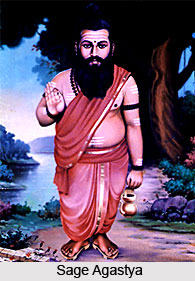 Agni Purana says that sage Agastya should be deemed as an incarnation of the god Hari and it is believed that a man by worshipping this venerable sage attains the latter`s divinity. The immortal Rishi should be worshipped during the three days and a three-quarter part thereof, before the entrance of the sun into the sign of Virgo. The worshipper should fast on the three days stated above, and worship the sage with Argha offerings, etc. The white and effulgent image of the sage, having complexion like the hue of a Kasha flower, should be invoked at night fall in a pitcher, full of water, and the night should be spent in vigil, after having addressed him as follows: "Accept this worship made by me in love, oh thou the greatest of the holy sages, oh thou whose mind is always filled with the noblest of thoughts, oh thou whose body is resplendent as the midday-sun." Thus having invoked the presence of the holy sage, the worshipper should offer him perfumes and sandal-paste, and worship him on the morrow with the Argha offerings, on the bank of a pond, by reciting the Mantra.
Agni Purana says that sage Agastya should be deemed as an incarnation of the god Hari and it is believed that a man by worshipping this venerable sage attains the latter`s divinity. The immortal Rishi should be worshipped during the three days and a three-quarter part thereof, before the entrance of the sun into the sign of Virgo. The worshipper should fast on the three days stated above, and worship the sage with Argha offerings, etc. The white and effulgent image of the sage, having complexion like the hue of a Kasha flower, should be invoked at night fall in a pitcher, full of water, and the night should be spent in vigil, after having addressed him as follows: "Accept this worship made by me in love, oh thou the greatest of the holy sages, oh thou whose mind is always filled with the noblest of thoughts, oh thou whose body is resplendent as the midday-sun." Thus having invoked the presence of the holy sage, the worshipper should offer him perfumes and sandal-paste, and worship him on the morrow with the Argha offerings, on the bank of a pond, by reciting the Mantra.
The Purana narrates that just as the sage Agastya is offered obeisance similarly the princess Lopamudra, the daughter of the king of Vidarbha, and the wife of the sage, should be worshipped by reciting the following prayer :" Obeisance to thee, O princess, O thou the wife of the holy sage, who hast undertaken the greatest vow of lifelong renunciation. O thou goddess, O thou Lopamudra of universal fame, accept this Argha offered by me."
It has also been said that the Argha to be offered to the holy sage Agastya, should be composed of bits of gold and silver, the five gems known as the Pancharatnam, a metal bowl containing the seeds and grains known as the Sapta-dhanya, curd and sandal-paste; and which should be offered without uttering any Vedic Mantras, where the penitent would belong to the Shudra community or to the opposite sex. The worship should be closed with the following prayer, "Accept this Puja made by me, O thou Agastya, who grantest all boons the greatest of all the holy sages and resplendent as the sun, and depart in peace from this place of worship.
Agni Purana narrates that for life the penitent should forego a class of paddy, a fruit or articles of a particular taste in honour of Agastya. Then the Brahmanas should be feasted with boiled rice, porridge, articles fried in clarified butter, sweetmeats, and confectionaries; and gifts of cows, clothes and gold should be made to them. It is believed that by offering such Arghas for a period of seven years, a woman becomes the mother of many children and the mistress of a large fortune, while a virgin becomes a princess by wedlock.












